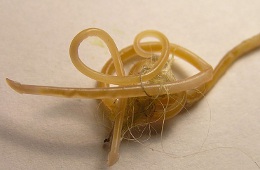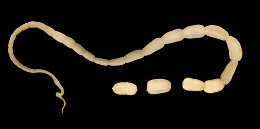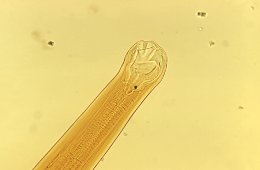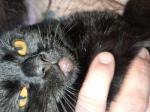What You Should Know about
Worms in Cats
Worms in cats are quite a common health problem, especially in kittens. Worms are so common, in fact, that your vet will typically test your cat annually via a stool sample.
Worms are internal parasites, feeding off of their "host." In this case, the host is your cat. Cats are susceptible to a number of internal parasites, but there are a few major players when it comes to worms.
The main types of worms in cats are roundworm, hookworm, tapeworm and heartworm. Fecal examinations are used for diagnosis, except in the case of heartworms.
Heartworms require a blood test, but diagnosis in cats is more difficult than in dogs. In fact, there is no reliable blood test for infected cats.
Typically, cats that share litter boxes will all be infected with the same intestinal parasite, so a fecal sample from one of the cats in the group is usually sufficient to determine if an infestation exists in the home.
By the same token, it is recommended that treatment be
administered to all felines sharing litter boxes or living space with a
known infected cat. Untreated, anyone of these can become a significant health issue for your kitty.
Roundworms

Roundworms (Toxocara cati) are spaghetti-like in looks, and usually are only visible when vomited up.
Roundworm is common in kittens, who can become infected via their mothers, even if the mother cat shows no signs of a current infection.
This is due to the encysted form of the roundworm that lies dormant in the mother cat. Veterinarians will usually worm kittens 2-3 times even if the fecal examinations are negative.
As a cat matures, there is a natural immunity that develops against this parasite. As a result, roundworm infestations severe enough to cause illness are unusual in adult cats.
Hookworms
Hookworms literally "hook" themselves to the intestinal wall of your cat.
Since hookworms are tissue feeders, they can cause blood loss, which results in anemia. An infected cat may also experience poor hair coat, intestinal illness, and weight loss.
The good news on hookworm infestation is that most of the pet medication used to treat roundworms will also kill hookworms. At least two treatments are needed to rid your cat of this worm.
Tapeworms

Fleas, as tiny as they are, can wreak all kinds of havoc on your cat.
Tapeworms are carried by fleas. Fleas ingest tapeworm eggs. Your cat ingests the fleas, and your kitty becomes infected.
The tapeworm then lives in the intestinal tract of the poor kitty, robbing him or her of nutrients!
These worms are made up of a long series of "segments." Each segment contains maturing eggs. The segments drop off the end of the worm's body, and along with their eggs are passed in the stool. When they dry out, they actually look like grains of rice.
Cat owners have been known to spot them around the cat's anus, in the litter box, or in heavily traveled areas. Sometimes your cat will have anal irritation, so if your cat seems to be doing some excessive licking in that area, look for signs.
Some cats will show no visible symptoms of illness. It should be noted that you cannot properly address the tapeworm issue without also addressing the flea problem.
Heartworms
Cats contract heartworms through mosquito bites. Cats are not natural hosts of heartworms, and are resistant. Sometimes, the worms will simply die off without much fanfare. It is possible, however, that a dead or dying worm will kill a cat, or cause severe lung damage.
Certain veterinary sources report that heartworm is seen in cats about one-fifth as much as dogs, but this may refer to the 20% of cases that actually exhibit the presence of heartworm offspring in the blood.
According to the American Heartworm Society the "distribution of feline heartworm infection in the United States seems to parallel that of dogs but with lower total numbers."
For cats, there is no single reliable diagnostic blood test for this type of worm. There are a variety of tests, the results of which taken together, however, can help to confirm heartworms.
Unfortunately, there is currently no approved safe treatment for this condition in the US.
Before administering preventative medication for this particular parasite, it is recommended that cats be tested for antibodies and antigens. Many vets will not prescribe this for cats unless significant risk is suspected, and the treatment will only be effective if used regularly.
Treatment
Treatment begins with a correct diagnosis from a qualified veterinarian. Your vet will make recommendations based on your cat's particular circumstances.
The bottom line? Have your cat tested at least annually. Bring a stool sample to the vet. Most vets I've dealt with will say that one stool sample for cats who share litter boxes is fine.
I will confess that there have been times when I have brought my cats to the vet, but forgotten the stool sample. Poor Teddie cat had to have a stick shoved up her butt! Remember your stool sample!
Image credits:
Ancylostoma braziliense mouth parts, CDC/Dr. Mae Melvin
Cat Illness Symptoms
Cat Lovers Only




Comments: What do you think?
Have your say about what you just read. Leave me a comment in the box below.